
Creation science or scientific creationism is a pseudoscientific form of creationism which claims to offer scientific arguments for certain literalist and inerrantist interpretations of the Bible. It is often presented without overt faith-based language, but instead relies on reinterpreting scientific results to argue that various myths in the Book of Genesis and other select biblical passages are scientifically valid. The most commonly advanced ideas of creation science include special creation based on the Genesis creation narrative and flood geology based on the Genesis flood narrative. Creationists also claim they can disprove or reexplain a variety of scientific facts, theories and paradigms of geology, cosmology, biological evolution, archaeology, history, and linguistics using creation science. However, the overwhelming consensus of the scientific community is that creation science fails to qualify as scientific because it lacks empirical support, supplies no testable hypotheses, and resolves to describe natural history in terms of scientifically untestable supernatural causes. Courts, most often in the United States where the question has been asked in the context of teaching the subject in public schools, have consistently ruled since the 1980s that creation science is a religious view rather than a scientific one. Historians, philosophers of science and skeptics have described creation science as a pseudoscientific attempt to map the Bible into scientific facts. Professional biologists have criticized creation science for being unscholarly, and even as a dishonest and misguided sham, with extremely harmful educational consequences.

West Ham United Football Club is an English professional football club based in Stratford, East London. They compete in the Premier League, the top tier of English football. The club plays at the London Stadium, having moved from their former home the Boleyn Ground in 2016.

West Ham is a district in East London, located 6.1 mi (9.8 km) east of Charing Cross in the west of the modern London Borough of Newham. The West Ham electoral ward covers part of the central area of that borough.
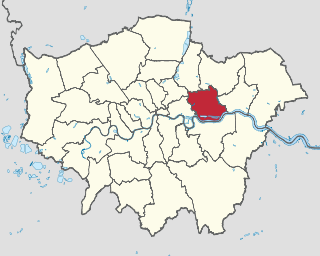
The London Borough of Newham is a London borough created in 1965 by the London Government Act 1963. It covers an area previously administered by the Essex county boroughs of West Ham and East Ham, authorities that were both abolished by the same act. The name Newham reflects its creation and combines the compass points of the old borough names. Situated on the borders of inner and outer East London, Newham has a population of 353,134, which is the third highest of the London boroughs and also makes it the 20th most populous district in England.

Kenneth Alfred Ham is an Australian Christian fundamentalist, young Earth creationist and apologist, living in the United States. He is the founder, CEO, and former president of Answers in Genesis (AiG), a creationist apologetics organization that operates the Creation Museum and the Ark Encounter.
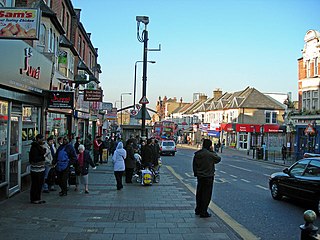
East Ham is a district of the London Borough of Newham, England, 8 miles (12.8 km) east of Charing Cross. East Ham is identified in the London Plan as a Major Centre. The population is 76,186.

The North Downs are a ridge of chalk hills in south east England that stretch from Farnham in Surrey to the White Cliffs of Dover in Kent. Much of the North Downs comprises two Areas of Outstanding Natural Beauty (AONBs): the Surrey Hills and the Kent Downs. The North Downs Way National Trail runs along the North Downs from Farnham to Dover.
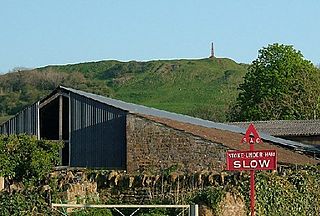
Ham Hill is a geological Site of Special Scientific Interest (SSSI), Scheduled Ancient Monument, Iron Age hill fort, Roman site, Local Nature Reserve and country park, to the west of Yeovil in Somerset, England.
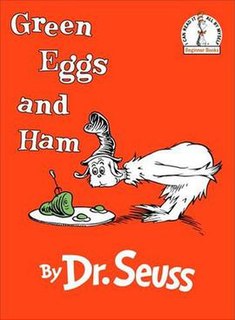
Green Eggs and Ham is a children's book by Dr. Seuss, first published on August 12, 1960. As of 2019, the book has sold 8 million copies worldwide. The story has appeared in several adaptations, starting with 1973's Dr. Seuss on the Loose starring Paul Winchell as the voice of both Sam-I-Am and the first-person narrator, Guy-Am-I, and more recently an animated TV series of the same name on Netflix.
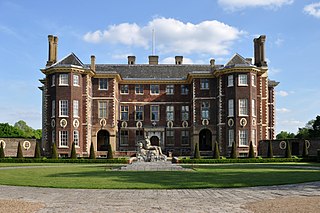
Ham is a suburban district in Richmond, south-west London. It has meadows adjoining the River Thames where the Thames Path National Trail also runs. Most of Ham is in the London Borough of Richmond upon Thames and, chiefly, within the ward of Ham, Petersham and Richmond Riverside; the rest is in the Royal Borough of Kingston upon Thames. The district has modest convenience shops and amenities, including a petrol station and several pubs, but its commerce is subsidiary to the nearby regional-level economic centre of Kingston upon Thames.
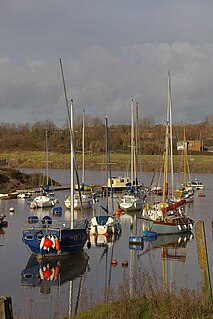
Pill is a village in North Somerset, England, situated on the southern bank of the Avon, about 4 miles (6 km) northwest of Bristol city centre. The village is the largest settlement in the civil parish of Pill and Easton-in-Gordano. The former hamlets of Lodway and Ham Green are now contiguous with Pill, and the village of Easton in Gordano is nearby. The parish extends northwest beyond the M5 motorway to include the Royal Portbury Dock.

Hamstone is the name given to a honey-coloured building stone from Ham Hill, Somerset, England. It is a well-cemented medium to coarse grained limestone characterised by marked bedding planes of clay inclusions and less well-cemented material which weather differentially to give exposed blocks a characteristic furrowed appearance. In origin, Hamstone is a Jurassic limestone from the Toarcian, or Upper Lias, stage.

Windsor Hill Marsh is a 0.84 hectare biological Site of Special Scientific Interest, north of the town of Shepton Mallet in Somerset, and adjacent to the Windsor Hill Quarry geological Site of Special Scientific Interest. It was notified in January 1972.
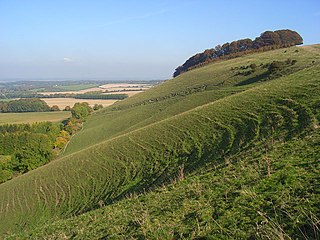
Ham Hill is an area of chalk downland in Wiltshire, England, on the steep banks running alongside the road from the village of Ham to Buttermere, close to the Berkshire border. A biological Site of Special Scientific Interest, notified in 1971, covers 1.5 hectares of the site; this designation is due to the site's species-rich plant and insect communities, which include some rare species. Notable among these is the musk orchid, which has been confirmed at only one other site in Wiltshire.
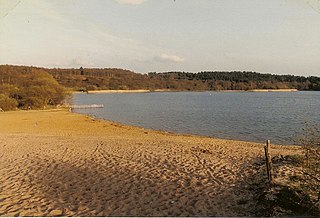
Frensham is a village in Surrey, England, next to the A287 road, 13 miles (20.9 km) WSW of Guildford, the county town. Frensham lies on the right bank of the River Wey, only navigable to canoes, shortly before its convergence with the north branch. Farnham is the nearest main town which is 3.5 miles (5.6 km) north.

Alcott House in Ham, Surrey, was the home of a utopian spiritual community and progressive school which lasted from 1838 to 1848. Supporters of Alcott House, or the Concordium, were a key group involved in the formation of the Vegetarian Society in 1847.

A cordon bleu or schnitzel cordon bleu is a dish of meat wrapped around cheese, then breaded and pan-fried or deep-fried. Veal or pork cordon bleu is made of veal or pork pounded thin and wrapped around a slice of ham and a slice of cheese, breaded, and then pan fried or baked. For chicken cordon bleu chicken breast is used instead of veal. Ham cordon bleu is ham stuffed with mushrooms and cheese.

Elections to Newham London Borough Council in London, England was held on 6 May 2010. This was on the same day as other local elections and the general election to the UK Parliament.

Philippine jade artifacts, made from white and green nephrite and dating as far back as 2000–1500 BC, have been discovered at a number of archeological excavations in the Philippines since the 1930s. The artifacts have been both tools like chisels, and ornaments such as lingling-o earrings, bracelets and beads.



















